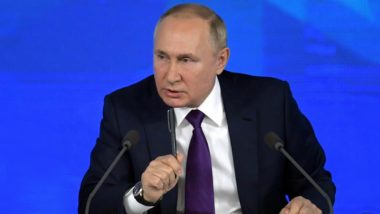Moscow, February 22: Russian lawmakers on Tuesday authorised President Vladimir Putin to use military force outside the country - a move that could presage a broader attack on Ukraine after the US said an invasion was already underway there.
Several European leaders said Russian troops rolled into rebel-held areas in eastern Ukraine after Putin recognised their independence. But it was unclear how large the deployment was, and Ukraine and its Western allies have long said Russian troops were fighting in the region, allegations that Moscow always denied.
Members of Russia's upper house, the Federation Council, voted unanimously to allow Putin to use military force outside the country — effectively formalising a Russian military deployment to the rebel regions, where an eight-year conflict has killed nearly 14,000 people. Russia-Ukraine Crisis: 'Soldiers Seen All Around', Says MBBS Students After Returning to India.
Shortly after, Putin laid out three conditions to end the crisis that has threatened to plunge Europe back into war, raising the specter of massive casualties, energy shortages across the continent and economic chaos around the globe.
He called for international recognition of Crimea as part of Russia, an end to Ukraine's NATO membership bid and a halt to weapons shipments there. The West has decried Russia's annexation of Crimea as a violation of international law and has previously flatly rejected permanently barring Ukraine from the NATO alliance.
With tensions rising and a broader conflict looking ever more likely, the White House began referring to the Russian deployments as an “invasion” after initially hesitating to use the term — a red line that President Joe Biden has said would result in the US levying severe sanctions against Moscow. He scheduled an address for later Tuesday.
"We think this is, yes, the beginning of an invasion, Russia's latest invasion into Ukraine,” said Jon Finer, principal deputy national security adviser, said on CNN. “An invasion is an invasion, and that is what is underway."
The administration initially resisted calling the troop deployment an invasion because the White House wanted to see what Russia was actually going to do. After assessing Russian troop movements, it became clear it was a new invasion, according to a US official who spoke on the condition of anonymity to discuss internal deliberations.
For weeks, Western powers have been bracing for this as Russia massed an estimated 150,000 troops on three sides of neighboring Ukraine — and promised swift and severe sanctions if it materialised. The European Union and Britain announced Tuesday that some of those measures were coming — and more were expected from the US, too.
Western leaders have long warned Moscow would look for cover to invade — and just such a pretext appeared to come Monday, when Putin recognised as independent two separatist regions in eastern Ukraine, where government troops have fought Russia-backed rebels. The Kremlin then raised the stakes further Tuesday, by saying that recognition extends even to the large parts now held by Ukrainian forces.
Kremlin spokesman Dmitry Peskov said that Russia has recognised the rebel regions' independence “in borders that existed when they proclaimed” their independence in 2014 — broad territories that extend far beyond the areas now under the rebel control and that include the major Azov Sea port of Mariupol. China Calls for Restraint on Ukraine But Silent on Vladimir Putin’s Declaration of Independence of 2 Separatist Regions.
Condemnation from around the world was quick. Ukrainian President Volodymyr Zelenskyy said he would consider breaking diplomatic ties with Russia and Kyiv recalled its ambassador in Moscow. But confusion over what exactly was happening in eastern Ukraine threatened to hobble a Western response. While the US clearly called it an invasion, some other allies hedged.
“Russian troops have entered in Donbas,” the name for the area where the two separatist regions are located, EU foreign policy chief Josep Borrell said in Paris. “We consider Donbas part of Ukraine." But in a distinction that could complicate a European and Western response, he added: “I wouldn't say that (it is) a fully fledged invasion, but Russian troops are on Ukrainian soil.”
Poland's Defence Ministry and British Health Secretary Sajid Javid also said Russian forces had entered Ukraine's east, with Javid telling Sky News that “the invasion of Ukraine has begun." Not all in Europe saw it that way. Spanish Foreign Minister José Manuel Albares noted “if Russia uses force against Ukraine, sanctions will be massive.”
The Kremlin hasn't confirmed any troop deployments to the rebel east, saying it will depend on the security situation. Vladislav Brig, a member of the separatist local council in Donetsk, told reporters that the Russian troops already had moved in, but more senior rebel leaders didn't confirm that. Late Monday, convoys of armored vehicles were seen rolling across the separatist-controlled territories. It wasn't immediately clear if they were Russian.
In response to the moves thus far, top EU officials said the bloc was prepared to impose sanctions on several Russian officials and banks financing the Russian armed forces and move to limit Moscow's access to EU capital and financial markets. They gave few details. EU foreign ministers met Tuesday to discuss the measures — but they did not appear to include the massive punishment repeatedly promised in case of a full-fledged invasion.
British Prime Minister Boris Johnson also said the U.K. would slap sanctions on five Russian banks and three wealthy individuals. While he said that Russian tanks have already rolled into eastern Ukraine, he warned a full-scale offensive would bring “further powerful sanctions.” Vladimir Putin Claims Minsk Agreements to Avoid War No Longer Exist.
The White House has also moved to respond, issuing an executive order to prohibit US investment and trade in the separatist regions, and additional measures — likely sanctions — were to be announced Tuesday. Those sanctions are independent of what Washington has prepared in the event of a Russian invasion, according to a senior administration official who briefed reporters on the condition of anonymity.
(The above story is verified and authored by Press Trust of India (PTI) staff. PTI, India’s premier news agency, employs more than 400 journalists and 500 stringers to cover almost every district and small town in India.. The views appearing in the above post do not reflect the opinions of LatestLY)


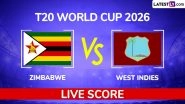

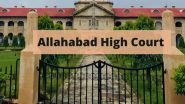
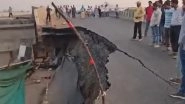


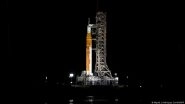
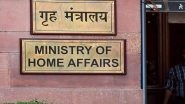
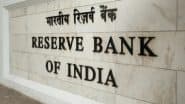


 Quickly
Quickly